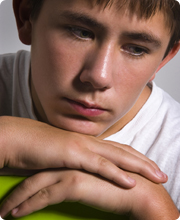Teens, Depression and Firearms
You can download this article as a PDF (English) (Russian) (Spanish) (Somali) (Simplified Chinese).
 How are teens, depression and firearms connected?
How are teens, depression and firearms connected?
- Depression is common among teens. One in five teens will go through a period of major depression by the time they are 18 years of age.
- Depressed teens are at risk for suicide.
- Suicide is the second leading cause of death among teens in Washington.
- Most teens and preteens who die by suicide used a firearm to do so.
Why Firearms Pose a Risk
- Firearms are quick and deadly.
- Suicide crises are often short-term. Having access to a firearm makes it easier to carry out the act.
- Many people keep unlocked firearms in their homes, making them easy to get.
- Preteens and teens who die by suicide often get the firearm from their home or the home of a relative or friend.
What You Can Do
The best way to protect your family from a firearm injury or death is to remove firearms from your home. This is especially important if a family member is depressed or suicidal, or is using drugs or alcohol.
If you choose to keep firearms in your home, you can help protect your family by locking up your firearms and ammunition. Locking up firearms makes it harder to act on impulse when depressed.
To protect your teen:
- Always store firearms unloaded, locked in a firearm safe or lock box, and the ammunition stored and locked separately.
- Use trigger locks or cable locks on all unloaded firearms, even when they are locked up in a safe. The more you can slow your teen down, the better.
- Use combination locks instead of keyed locks – preteens and teens often know where the keys are.
- Lock up all of your firearms, even if your teen has had firearm safety training.
- If a family member is depressed, suicidal or using drugs or alcohol, temporarily remove firearms from your home.
- Ask family and friends to use safe firearm storage.
- When your teen goes to a friend’s home, ask if there is a firearm in the home and how it is stored.
- Talk with your teen about firearms when you discuss other risks, like alcohol and drugs.
Listen, Ask Questions and Get Help When Needed
If you think a preteen or teen is depressed or suicidal, don’t wait to help.
- Listen. Show them that you care about how they feel by listening.
- Ask questions. Be direct and ask if they have thought about suicide. Asking about suicide will not put the idea in their head.
- Get help when needed. If they say they have thought about suicide or you think they have thought about it, get help right away and don’t leave them alone. If you’re not the parent or caregiver, tell them. Or, tell the school counselor, a mental health professional or call the 988 Suicide & Crisis Lifeline at 988. Do not keep it a secret!
- Get help for depression even if a teen is not thinking about suicide. Take action when signs of depression or anxiety begin to get in the way of a teen’s ability to take part in school, family and social activities. Ask your teen’s doctor if you are concerned. If you’re not the teen’s caregiver, tell their parent or a trusted adult.
Teach your teen to follow these steps if they are concerned about someone they know.
Resources
- To learn more about depression and suicide in preteens and teens, go to:
- For more information on safe firearm storage and for ways to ask if firearms are safely stored in the homes your teen visits:
- For help during a crisis:
- 988 Suicide & Crisis Lifeline Call or text 988 if you, your child, family or friend needs help right away.
